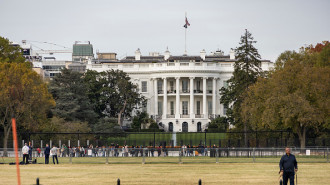UAE's blockade on Qatar spread a 'climate of fear'
The UAE has spread a "climate of fear" among Qataris living there during a year-long blockade, separating families and causing "substantial pain", the UN's top court heard Friday.
Doha is appealing to the International Court of Justice (ICJ) in The Hague to order emergency measures to lift the restrictions imposed on Qataris by the UAE in June 2017.
"Many Qataris still resident in the UAE live in perpetual fear, they live in the shadow of the UAE's expulsion order," leading British barrister Lord Peter Goldsmith, acting for Doha, told the court.
Saudi Arabia, the UAE, Bahrain and Egypt severed ties with Qatar last June over accusations of supporting extremism and being too close to rival Iran, charges Doha has denied.
The four countries enforced a blockade on Doha, closing land, sea, and air links to the country. Gulf states also ordered Qataris to leave within 14 days as well as calling home their own citizens.
Saudi Arabia has threatened to dig a canal across its border with Qatar, effectively making the Gulf peninsula state an island, sparking outrage in Doha.
Goldsmith told ICJ judges on the third and final day of the hearing that helplines the UAE set up to help Qataris understand the restrictions were in fact linked to the Abu Dhabi police.
So Qataris are "too scared to call hotlines to register their presence or their families' presence for fear of reprisals".
Goldsmith also contended that every proposed "trip to the UAE by a Qatari requires a separate approval no matter the circumstances".
So in the case of one Qatari woman, for example, who needs regular medical treatment in Beirut, every time she leaves, "she risks being unable to return" to her family in the UAE.
Qatari students at UAE universities were also sent emails telling them they had been withdrawn. Many have since dropped out of their higher education courses.
Concerns raised over the past months by Human Rights Watch and Amnesty International have shown "compelling evidence of what has happened, with substantial pain inflicted," Goldsmith argued.
"Historically the people of Qatar and its neighbours have been close. For decades Qataris and Emiratis have worked together, prayed together and married into each other's families," said Mohammed al-Khulaifi, Qatar's lawyer.
"Despite these close ties" the UAE implemented a "series of broad discriminatory measures against my country and its people on the basis of their Qatari nationality", he told a 16-judge bench at the tribunal.
"The UAE has fostered such an environment of hate against Qatar and Qataris that individuals in the UAE are afraid even to speak to family members living in Qatar," he said.
Qatar says the Saudi-led bloc are seeking regime change in Doha, while the spat has remained in a stalemate.
The UAE and Saudi Arabia in turn announced Wednesday that they will file a separate complaint at the ICJ, accusing Qatar of violating their airspace.
The four nations have demanded Doha accepts a list of 13 conditions, including shutting Al Jazeera and The New Arab, to open a dialogue to resolve the conflict.
Mediation efforts, mainly led by the emir of fellow Gulf state Kuwait, have so far failed to break the deadlock.
While the crisis has shaken the politics of the region, it has also had serious impact on the lives of ordinary civilians on the ground.
A report published last week found that families had been separated, imports - including medicine - obstructed, among other obstacles.
In January, the UN's human rights office accused the four countries of orchestrating a hate campaign against Qatar, which included threats to kill the country's emir.





 Follow the Middle East's top stories in English at The New Arab on Google News
Follow the Middle East's top stories in English at The New Arab on Google News


